Abstract
The EU’s energy policy is geared towards introducing changes in order to stop or avoid negative climate change. The determinants of the energy policies of Poland and Germany are presented along with the priorities until 2050. The possibilities of reducing the impact of energy on the environment were interpreted, emphasizing its common goal. Activities supporting the EU and maintaining the level of energy security are indicated. Possible negative effects in the social and health sphere are presented as a response to the failure to implement these demands. The literature was analyzed and proprietary questionnaires were carried out, and the results realized in the EU by the independent FBI Economic Department were implemented. On the basis of earlier pilot studies, variants of a successful transformation were implemented, assuming different roles performed by a citizen (entrepreneur). Opportunities to tackle climate change and global challenges have been identified based on innovation and motivation. The opinion on the way of thinking in Poland and Germany was compared, and a descriptive model was prepared to increase the achievement of the assumed goals, together with a model based on innovation. Citizens should be active in efforts to promote renewable energy. The EU has a strong base to work to avoid climate change. What is needed is innovative thinking and a motivation to introduce changes with the involvement of every citizen through solidarity, efficiency, and justice. The existing foundations of legal solutions create adaptation possibilities and the ability to achieve goals through self-discipline, comparing with the assumption of EU civic awareness, significantly affecting the successful implementation of RES. Analyzing the attitudes of Poland and Germany, it seems that the distant social consequences are not sufficient. It is necessary not only to perform selected management functions (planning, organizing), but also partly to motivate. There is a strong need to increase motivation and implement the control process required under the threat of negative consequences in the current period as a key strategic preventive action. The analysis of the opinions of Poland and Germany against the background of the European Union allowed for no significant differences, subject to Germany’s readiness to take greater risk. Most of Poland is less inclined to take risks. The lack of an unambiguous opinion may indicate incomplete awareness of both the negative effects of climate change. Both countries are concerned about the unplanned costs of transformation. Germany, unlike Poland, has dedicated employees to handle the climate, and conducts an energy audit and is of interest to investors, thanks to investment plans.
Keywords:
change; citizen; green energy; renewable energy; energy; comparative analysis; Poland; Germany; EU 1. Introduction
European Parliament communication on “Clean Energy [1]: Energy Innovation through a Change of Thinking” was given in early February 2018 [2]. Three main elements were highlighted, the first of which is that citizens should be actors of change, not passive consumers [3].
The second key aspect was information about coherent and stable EU funding and programming. The third was information that the EU should maintain and strengthen its position as a global leader [4]. An innovative way of thinking towards renewable energy sources assumes action aimed at the implementation of the assumed postulates [5].
Comparing 2018 with 2021, one can draw uniform conclusions that intensive efforts are being made to introduce innovative solutions, such as renewable energy sources, around the world. This article focuses on two countries: Poland and Germany, presenting a literature study in this field and original research using the STATISTICA program [6]. It is worth emphasizing that all kinds of postulates and directives are prepared by specialists in this field, usually having a large theoretical and practical basis.
Positive attitude to actions aimed at introducing changes in the scope of stopping or avoiding climate change will be received positively [7], which has been noted in the literature on the subject [8,9,10,11].
1.1. Conditions for the Implementation of the RES Strategy
It should be emphasized that the strategy for implementing green energy thanks to renewable energy sources is based on all activities aimed at limiting the negative effects of climate change or stopping these changes.
Adoption of the key assumptions of the integrated energy and climate program preceded the concept of energy policy until 2050. Applicable EU regulations assume a minimum 40% reduction in greenhouse gas emissions (compared with 1990), thanks to an increase in the share of renewable energy to 32%, and a 32.5% improvement in energy efficiency [12,13,14,15]. Figure 1 below shows the determinants of the energy policies of Poland and Germany.
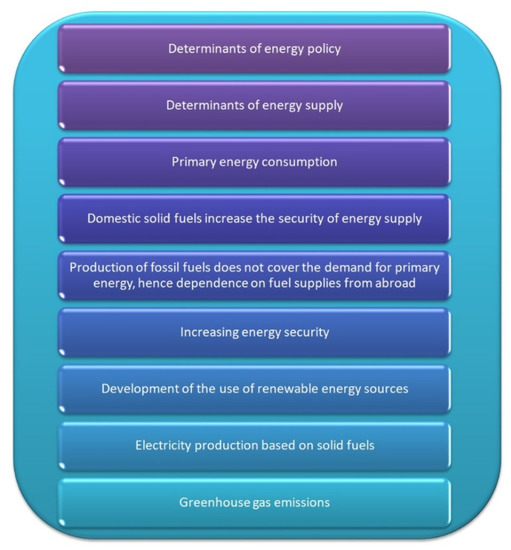
Figure 1.
Determinants of the energy policies of Poland and Germany [16].
In addition to the three classic energy policy objectives [17,18,19], cost reduction, access security and increasing competitiveness, and reducing environmental burdens, we define a fourth policy objective, which is to increase the domestic energy technology industry. Policy has been created through key factors. Thanks to technological innovation, important policy goals can be met. It seems that the possible environmental and local benefits in society are overestimated as a result of low-emission energy methods in Poland. Energy policies overestimate energy demand and underestimate energy supply costs. Homeowners, farmers, and small and medium-sized enterprises may become the largest group of beneficiaries of the implementation of new technological solutions. It will be difficult to achieve in the long run. For the needs of the corporation, business models and regulations could block the development of socialized systems.
Without proper planning of the RES micro-installation market, Poland may miss numerous economic benefits in the future. Of considerable importance to this process are the networks of installers and producers of devices for households, small businesses, and ultimately, operators of micro and smart energy networks [20,21,22,23,24,25].
Change of policy in Germany was not dictated by the higher conditioning of high-level policy goals that concerned lower-level technologies [26].
On the other hand, in the draft energy policy of Poland until 2050, it is important to ensure the energy security of the state and to meet the energy needs of enterprises and households in the direction of creating conditions for the sustainable development of the energy sector, as shown in Figure 2.
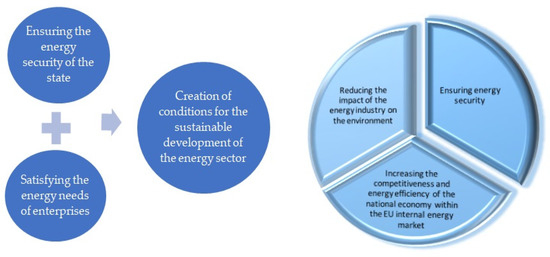
Figure 2.
Priority projects until 2050 [27].
Meeting the conditions for the sustainable development of the energy sector, also contributing to the development of the national economy. The following three operational objectives were subordinated to the implementation of the main objective: ensuring energy security, increasing the competitiveness and energy efficiency of the national economy within the EU internal energy market, and limiting the environmental impact of the energy sector, as shown in Figure 3.
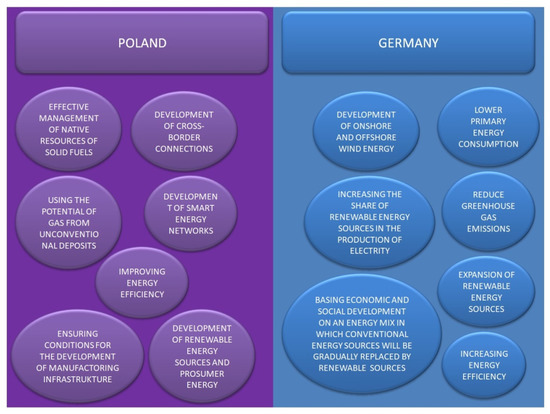
Figure 3.
Actions to reduce the impact of energy on the environment [28].
According to Poland and Germany, the interpretation of various possibilities to reduce the impact of energy on the environment has one key common goal—low-emission and pollution reduction.
The previously indicated priorities should be verified. Poland presents effective management of domestic solid fuel resources, improvement of energy efficiency, use of the potential of gas from unconventional deposits, development of renewable energy and prosumer energy, development of intelligent energy networks, and cross-border connections. Additionally, it is possible to point to the provision of conditions for the development of production infrastructure. The measures relating to Germany consist of increasing the share of renewable energy sources in electricity production and reducing greenhouse gas emissions by basing economic and social development on an energy mix in which conventional energy sources will be gradually replaced by renewable sources. Activities also consist in reducing primary energy consumption, expansion of renewable energy sources, development of onshore and offshore wind energy and increasing energy efficiency. The measures taken in this area at the European Union level are also a point of reference for the energy policy of Poland and Germany. It can be assumed that Poland and Germany, despite the different conditions of national energy policies, will support specific measures at the EU level (Figure 4).
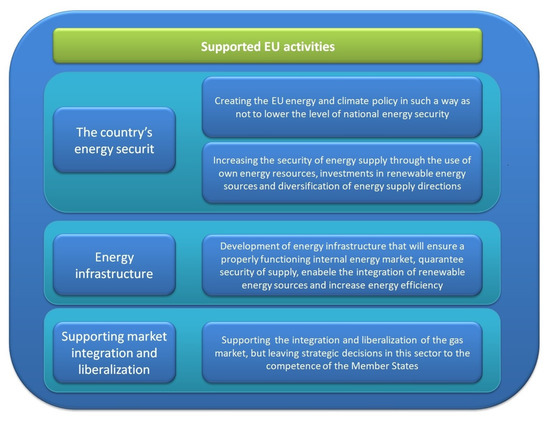
Figure 4.
Supported EU activities [29,30,31].
The key is to create the EU energy and climate policy in such a way as not to lower the level of energy security of the country. The functioning consists of increasing the security of energy supply through the use of own energy resources, investments in renewable energy sources, and the diversification of energy supply directions. This is thanks to the development of energy infrastructure that will ensure a properly functioning internal energy market, guarantee security of supply, enable the integration of renewable energy sources, and increase energy efficiency by supporting the integration and liberalization of the gas market, but with a view to leaving strategic decisions in this sector to the Member States.
Moreover, in the case of Poland, in relation to EU activities, it should be expected that such an approach to environmental protection requirements will be emphasized in the position which, to the greatest possible extent, will take into account the specificity of the Polish energy sector. On the other hand, in the case of Germany, the focus of the support provided for measures taken at the European Union level will be to ensure the sustainable development of the energy sector by raising efficiency and safety standards, increasing competitiveness, and significantly reducing greenhouse gas emissions.
1.2. Determinants of Negative Consequences of Failure to Meet Clean Energy Requirements
The social sphere on the use of fossil fuels to meet energy demand also has negative effects in this area. The extraction of coal or oil often results in accidents [32,33]—on drilling platforms [34,35,36,37] or in mines. It can also result in oil spills from tankers to the seas and oceans [38]. Climate warming, caused, to a large extent, by the exploitation of non-renewable energy sources, is raising the water level. Therefore, this may mean that people will have to leave their places of residence because these places will no longer be fit for life—they will be flooded. Research shows that by 2050, countries that are surrounded by or near water could be under water. Negative factors in the social sphere are presented in Figure 5.
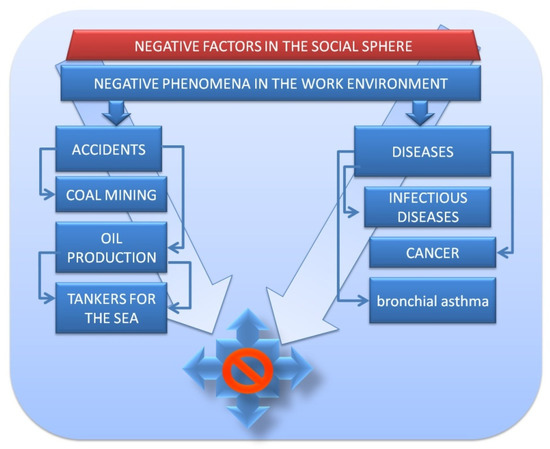
Figure 5.
Negative factors in the social sphere [39,40].
Social issues are also closely related to health. Warmer temperatures and warmer climates can cause infectious diseases such as malaria to spread more quickly [41,42,43,44]. In addition, inhaling the products of coal combustion is also extremely harmful to health [45]. Suspended dust and heavy metals cause inflammatory processes in the body, and in the long run, lead to mutations that result in the development of cancer. Children feel the most impact of breathing polluted air—their respiratory system is the least resistant. Hence, there are increasingly frequent problems with asthma [45,46,47,48] and bronchitis in younger people [49]. Fossil fuels as a raw material in the economy are becoming less and less profitable; sticking to them also results in negative phenomena in the sphere of work [50]. This can be seen, for example, in mines, the operation of which in many cases ceases to be profitable. The lack of a good economic balance often means one thing—job cuts [51]. In this context, switching to alternative energy sources would be an impulse to create many new jobs and expand the labor market in fields based on modern technology and high-performance industries. The last argument in favor of RES is also simply that by using renewable sources, we ensure a better quality of life both now and in the future [51].
Figure 6 shows the possible effects of negative climate change.
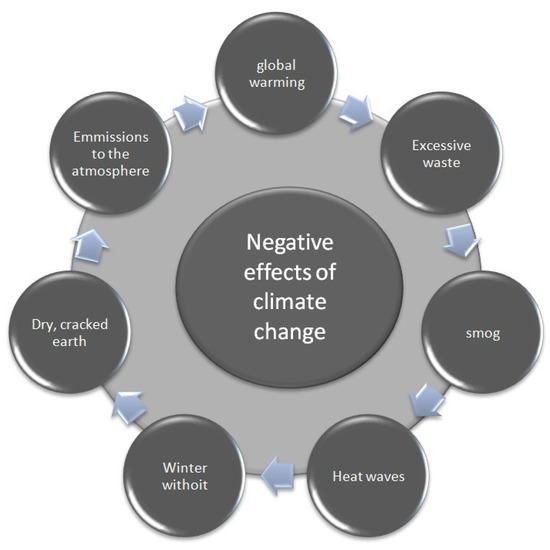
Figure 6.
Effects of negative climate changes [52,53].
Innovation is needed, especially in the way of thinking [54]. The field of innovation policy studies is at a crossroads. This clearly had an impact. However, can it lose the critical insight necessary to remain so in the future? We discuss four dangerous trends seen in many innovation policy studies: idealizing political justifications and policy makers; treating policies as tools in the toolkit; placing too much faith in the coordination and intelligent design of policy mixes; and adopting an atemporal approach to innovation policy. On this basis, we identify certain approaches that we claim would better deal with the complex multi-stakeholder dynamics, fundamental uncertainties and challenges in implementing, coordinating and evaluating policies, and that would enable more relevant and effective innovation policy research [55].
In terms of the development of renewable energy sources, the share in gross final energy consumption in Poland in 2018 amounted to approximately 11%, with the assumed national target of 15% [56,57].
2. Materials and Methods
The first part of the article presents the theoretical foundations of energy policy aimed at reducing climate change and the theoretical conditions for the negative consequences of failure to meet clean energy requirements.
The research methods used for the discussed analyses and developed recommendations were a review of the world literature on the subject in question and a statistical analysis of quantitative data of the largest statistical organizations in the EU and in the world. They belong to them International Energy Agency (IEA), the International Atomic Energy Agency (IAEA), the European Statistical Office (Eurostat), and statistical offices in European countries.
The second part concerns the results of international research for Poland and Germany against the background of the European Union and includes original research in this field (Section 3.1.2).
3. Result
3.1. International Results for Poland and Germany against the Background of the European Union
The growing COVID-19 wave has become a direct cause of focusing attention on efforts to reduce air pollution. It turns out that 60% of companies state that climate change is a physical threat [58]. It is worth emphasizing that companies in the EU and the United States tend to underestimate the risks associated with energy transformation. Companies are unaware of the risks. Those who are aware of the risk invest significant resources in activities reducing the negative effects of climate change. When analyzing levels of investment in the years 2020 and 2019, it can be indicated that in 2019, individuals and companies were about 10% less invested in saving the atmosphere than in 2020 (about 50% of respondents’ statements). The reasons limiting the lack of investment from companies are the uncertainty of regulations and taxation as well as investment costs (less than 40% of respondents’ statements). Assessment towards a sustainable economy allows Europe to identify the need for a comprehensive strategy with clear provisions for a strong climate policy and for investment by both public and private actors in the European economy.
Firms aware of the impact of climate hazards on their business are more likely to invest in the climate. Ignoring climate risks can lead a company to underestimate the long-term benefits of mitigation and adaptation investments while overestimating non-climate investments to reap the short-term benefits. Therefore, it can be expected that climate investments will vary depending on the climate risk.
3.1.1. Study of Poland and Germany against the Background of the EU
The survey was carried out on 13,500 participants in the European Union by the EIB Department of Economics [59]. The results are weighted by industry group (sector), company size class, and country. An EU-wide survey was carried out, which collected qualitative and quantitative information on the investment activities of both small enterprises (employing between 5 and 250 employees) and larger enterprises (employing more than 250 employees).
Figure 7 below presents the results of research on the characteristic features of climate change in the opinion of Poland and Germany in comparison with the European Union.
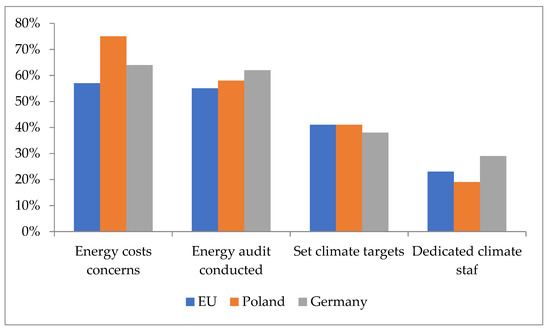
Figure 7.
Characteristic features of climate change in the opinion of Poland and Germany compared with the European Union.
The presented results allow us to conclude that in Poland (over 70% of respondents’ statements), respondents are most concerned about energy costs, then about 18% are less concerned about Germany and the European Union in global terms—least, but more than half (less than 60% of respondents’ statements).
The audit was carried out to the greatest extent by Germany (62% of respondents’ statements), followed by Poland (4% less than Germany), but slightly exceeded the average values from the European Union (over 50% of respondents’ statements).
The results in terms of climate goals are very similar, where only Germany has 3% less compared with Poland and the European Union. The data indicating the dedicated climate staff in the entire European Union indicate only 23% on average (according to the respondents’ statements), 4% less in relation to Poland, and 6% more in relation to Germany. Figure 8 below presents the opinion on the investment.
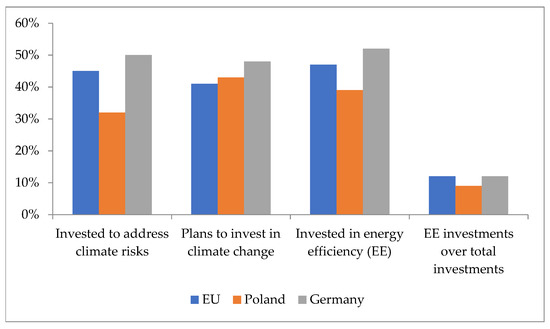
Figure 8.
Investment opinion.
Mostly 50% invested in counteracting climate threats is indicated by Germany, where less than 5% less is the average of all European Union countries. Only 32% of respondents indicated action in this area in Poland. The plans to invest in climate change contain very similar values above 40%, starting with the European Union, then Poland and Germany, respectively. Perceptions of climate risk in terms of demand are detailed in Figure 9 below.
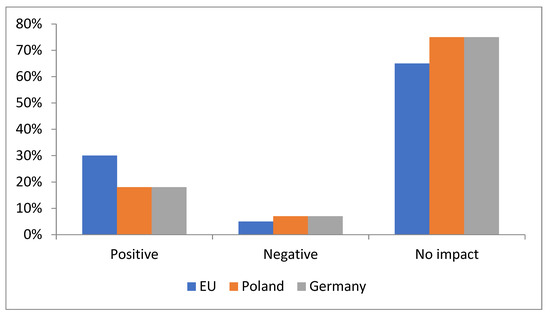
Figure 9.
Opinion on demand.
The opinion on demand shows the highest degree of no impact, equal to 75% of respondents in Poland and Germany, and 10% less than the European Union. In this respect, the European Union presents 30% positively. Poland and Germany agree on 18%. In turn, negative issues concern Poland and Germany in 7% and about 2% of the entire European Union.
The opinion on the supply chain applies to the least extent to the positive side, achieving comparable results of 3%, 4%, and 5% in proportion to Germany, Poland, and the European Union. The highest degree of no impact was achieved, comparable to the average difference of about 10%, where the European Union has at least 65%, then Germany and, to a greater extent, Poland, have 76% of indications. A total of 30% of the European Union is most negatively affected, followed by Germany at 26%, and finally, Poland at only 18% (Figure 10).
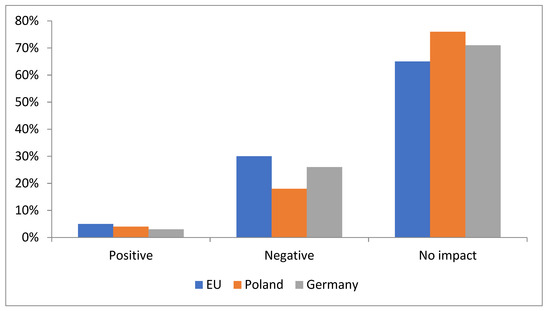
Figure 10.
Opinion on the implementation of the supply chain.
The reputation opinion mostly concerns no impact, where there is only a 3% difference between Poland and Germany (to a greater extent it is Germany). The European Union has a result of 55%. The reputation is most positive in the European Union (35% of respondents’ statements), 20% in Poland, and less than 2% less in Germany. In only 10% of the European Union, negative reputation is affected half as much in Poland and 4% in Germany (Figure 11).
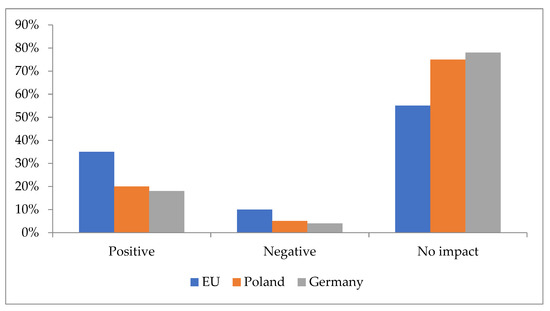
Figure 11.
Reputation feedback.
Figure 12 below presents a comparison of companies’ reactions to the climate crisis in Poland and the EU.
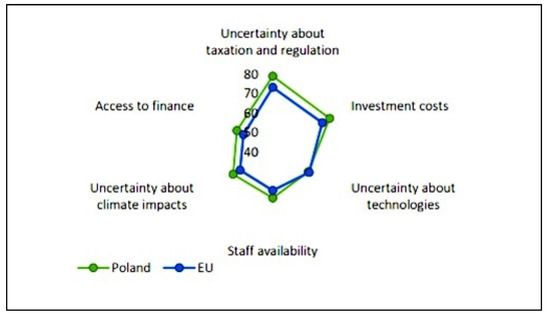
Figure 12.
Comparison of companies’ reactions to the climate crisis in Poland and the EU (%).
Poland has reacted to the climate crisis to a greater extent (has greater objections) than the European Union. Poland and the European Union are equally not convinced (uncertain) regarding the implementation of technological activities.
In turn, the following figure (Figure 13) compares the reactions of companies to the climate crisis in Germany and the EU.
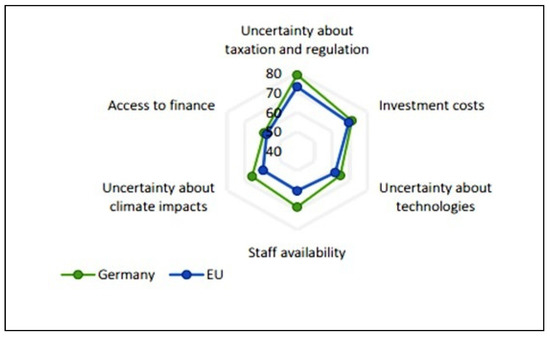
Figure 13.
Comparison of companies’ reactions to the climate crisis in Germany and the EU (%).
Germany’s reaction is similar to that of Poland and greater than that of the European Union. Germany takes a very similar position in terms of uncertainty about technologies, taxation, and regulation. The same position is taken in access to finance and investment costs.
Figure 14 below shows the obstacles related to climate change in Poland compared with the European Union.
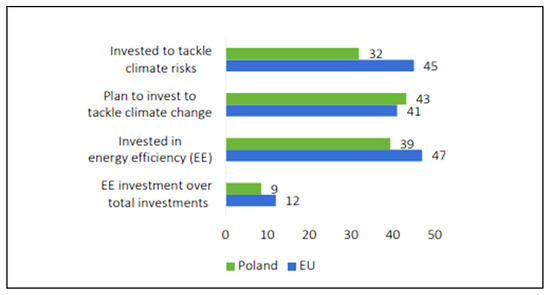
Figure 14.
Obstacles for companies with climate change in Poland and the EU (%).
The greatest investments were made in counteracting climate threats in the European Union and investing in energy efficiency, where it is lower by over 10% in Poland. Investments in global terms are 3% lower in Poland in relation to the European Union, which has 12%.
The following Figure 15 shows the barriers for companies to climate change in Germany compared with the European Union.
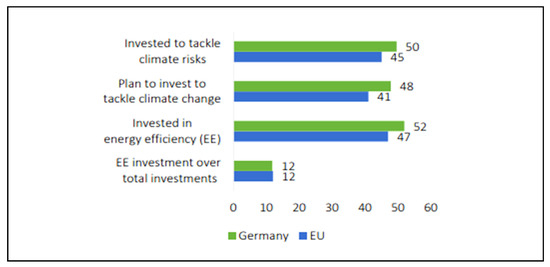
Figure 15.
Obstacles for businesses in climate change in Germany and the EU.
The obstacles for companies are very similarly related to risk-related investments as well as invested in energu efficiency (EE) and plan to invest to tackle climate change (vary at all levels around 3%) in Germany. The situation is comparable in the European Union, but less than 3% to 5% on average. The same result is with EE investment over total investments.
Figure 16 below presents the way entrepreneurs perceive the impact of climate change on their business activities.
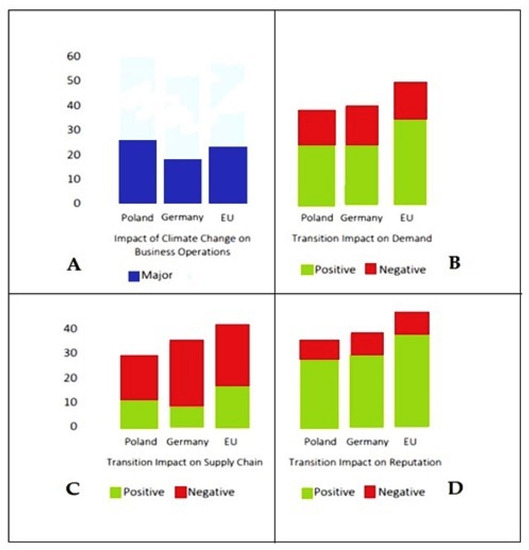
Figure 16.
(A–D) Ways of interpreting climate change (%).
The greatest impact of climate change on business operations is noticeable in Poland and the European Union (2% difference; Figure 16A). The transition impact on demand, on the other hand, is positively perceived and is comparable in Poland and Germany, and it is worth adding that these two countries are on average below 10% lower than the EU average (Figure 16B). When it comes to the issue of the impact of transformation on the supply chain, it is mostly negative, mostly in Germany and the European Union (Figure 16C). Transition impact on reputation concerns mostly all of them with a comparable percentage between Poland and Germany (2% difference), and in the European Union it is 38% (Figure 16D).
Table 1 below presents the opinion on climate change in the international arena.

Table 1.
Opinion on the implementation of climate changes.
The share of German companies perceiving the physical and transformation-related risks is lower than the EU average. Most companies believe the transformation will positively impact their demand and reputation. Those who acknowledge the risks of the transition believe that it will negatively affect their supply chain. The percentage of companies investing or planning to invest to counter climate threats is higher than the EU average. Firms report more obstacles to climate investment than the EU average, with tax and regulatory uncertainty being the most cited. The share of Polish companies perceiving physical risks is higher than the EU average, whereas it is lower in terms of transition risk. Most companies believe the transformation will positively impact their demand and reputation. Those who acknowledge the risks of the transition believe that it will negatively affect their supply chain. The percentage of companies investing in counteracting climate threats is lower than the EU average, despite a greater share of companies planning investments in the future. Firms report more obstacles to climate investment than the EU average, with tax and regulatory uncertainty being the most cited.
3.1.2. Original Study of Poland in Germany
The first part of the article presents the consequences of the lack of implementation of the clean energy postulates in terms of inactivity as well as the negative factors of the social sphere, together with the possibility of effective prevention.
The developed part of the article was aimed at making the potential recipient (reader) aware of the essence of the threat and the social role created by a particular person—a citizen of Poland, Germany, or other countries.
Methods of statistical analysis were used to develop the research results—sample randomness test. As of the end of April 2021, 38,268,000 residents residing in Poland were recorded in the GUS register [60]. In turn, in Germany, there were 83.2 million people according to the estimates of the Federal Statistical Office (Destatis) in Wiesbaden [61]. Data in both countries include the change caused by the COVID-19 pandemic. The respondents were randomly selected for the study.
The descriptive statistics show that the representative sample from Poland (38,268,000) is the minimum number of people in the study: 384. In turn, in Germany, out of 83.2 million, it is also 384. It was assumed that in both countries, the size of the fraction is estimated at 0.5, a maximum error of 5%, and a confidence level of 95%. Equally, 640 questionnaires were accepted, both from Poland and Germany. The research was carried out with the use of electronic questionnaires, thanks to the fast flow of information. The subjects of the research were people—citizens of Poland and Germany.
The main research objective was to verify (opinion) the attitude towards the implementation of green energy as a success in various conditions by Polish and German citizens playing a different role.
Main hypothesis: The civic awareness of Poland and Germany influences the successful implementation of RES.
Detailed hypothesis:
Hypothesis 1 (H1).
Gender has no influence on the decisions made in both countries surveyed.
Hypothesis 2 (H2).
The adopted role of a citizen may influence the opinion on the possibility of successful implementation of renewable energy sources.
Hypothesis 3 (H3).
The active role of the citizen is crucial in increasing the possibility of successful implementation of RES.
Hypothesis 4 (H4).
Citizens playing the role associated with the enterprise (entrepreneurs) and in a married couple have greater convictions towards the implementation of RES postulates.
Hypothesis 5 (H5).
The way of thinking (beliefs, decisions) is crucial for learning (benchmarking).
Hypothesis 6 (H6).
There are different solutions to obtain information on the negative effects of climate change and positive ones in terms of reducing or avoiding climate change.
Hypothesis 7 (H7).
The opinion of Polish and German citizens does not differ significantly in terms of their perception of success.
Hypothesis 8 (H8).
Germany, to a greater extent than Poland, indicates success without any conditions for people actively using innovation. Success in Germany is independent and unqualified.
Hypothesis 9 (H9).
Natural persons without a couple (not running a business) to a moderate (medium degree) unanimous vote both in Poland and Germany tend to be successful without any conditions.
Hypothesis 10 (H10).
The opinion of entrepreneurs who are aware of the matter states that both countries do not believe in success to a large extent, and they believe in its implementation to a large extent without any conditions.
Hypothesis 11 (H11).
The opinion of people running a business without marriage (cohabitation) indicates success regardless of the respondents in both countries.
The research was conducted in the period from February 2021 to August 2021, both in Poland and Germany, in the form of obtaining information data via Internet resources in a survey manner.
The conducted research is aimed at verifying whether the citizens of two countries, both Poland and Germany, are prepared for changes aimed at reducing climate change. The authors aim to present the essence of their positive thinking in this direction. It seems that a change of mind is needed. It may be crucial to examine your thinking process.
The strategy of the adopted analysis process is presented in Figure 17.
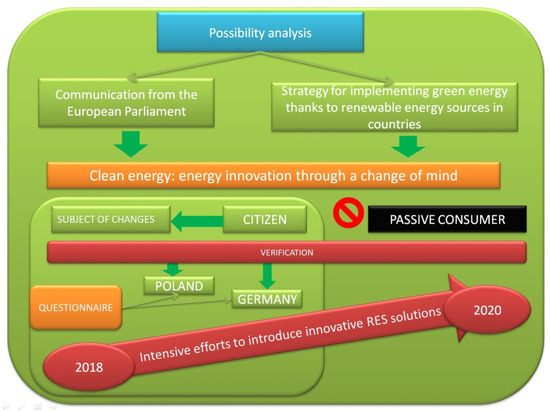
Figure 17.
The adopted strategy of the performed analysis.
The adopted research process consists of verifying, in accordance with the Communication of the European Parliament in 2018, what the pursuit of the postulates looks like through intensive efforts to introduce innovative solutions for renewable energy sources in 2020.
The citizen was placed in the key place of the analysis (in the center) as a subject of change, not a passive consumer. For this purpose, it was proposed to compare Poland and Germany in terms of the way of thinking.
Taking into account this information, on the basis of the conducted pilot study, it was considered what influences the decisions of citizens in order to learn their way of thinking and whether it is consistent with the pursuit of the implementation of RES postulates.
An analysis was made in the aspect of decisions made in terms of gender. However, this relationship is not statistically significant (p = 0.667).
A statistically significant relationship occurred between the role in the state and the opinion regarding the possible decision made (p = 0.006) and the opinion on the possibility of achieving success (p = 0.003).
Information about the roles was obtained in the pilot studies.
The pilot studies showed that people (citizens) make different decisions depending on what role they play (Figure 18). The authors distinguished between citizens:
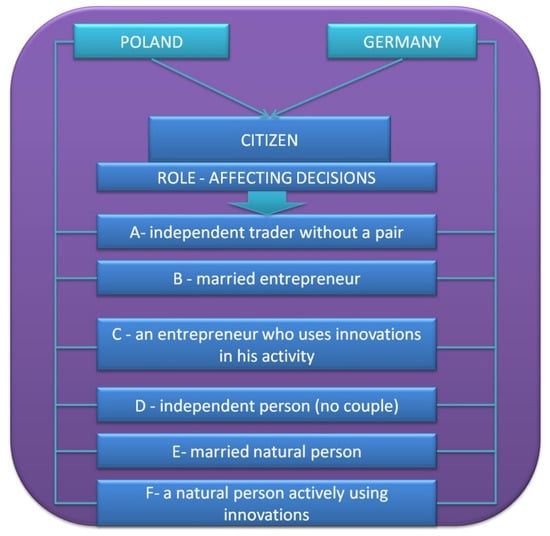
Figure 18.
Possible assumed roles of a citizen.
A—independent trader without a pair, B—married entrepreneur, C—an entrepreneur who uses innovations in his activity, D—independent person (no couple), E- married natural person, and F—a natural person actively using innovations.
Figure 19 below shows the possible roles of the citizen.
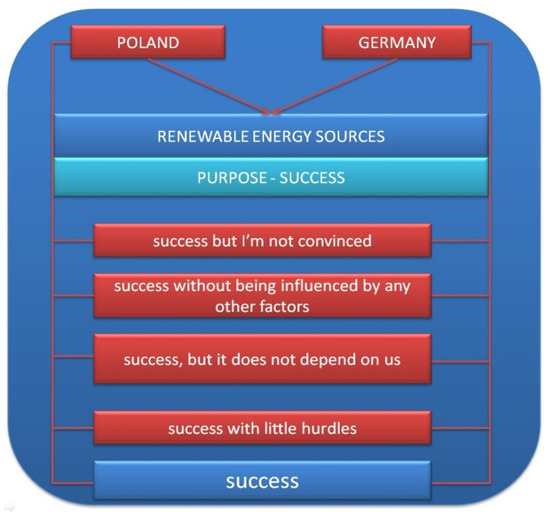
Figure 19.
Accepted Success Opportunities.
Citizens make decisions both individually, and in the company and the family circle. If these are all the conditions and circumstances for achieving success in the field of renewable energy sources, it may turn out that the citizen’s decision-making (his passivity) may be an obstacle to the achievement of the assumed goals.
Several possible solutions were adopted for the analysis of the factor without country division with the assumption of success, which is presented in Figure 19.
In order to facilitate the resultant part, four variants of success were adopted, and simplified the lack of success without distinguishing between individual variants.
Citizens of Poland and Germany, i.e., natural persons actively using innovation, were examined in order to determine success with different assumptions or not, i.e., no success, which is presented in Figure 20.
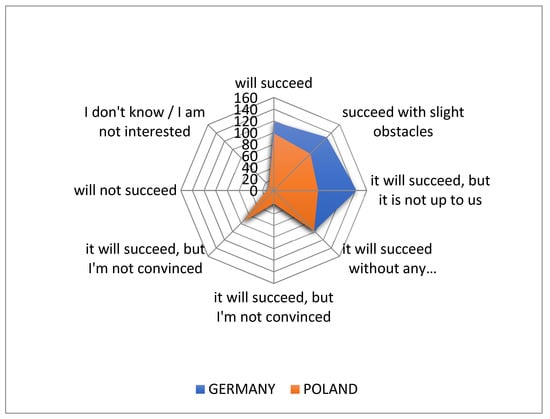
Figure 20.
Opinion of individuals actively using innovations in Poland and Germany (number of people).
From the presented Figure 21, we notice that the Germans are definitely more determined to succeed than the Poles. Poland is 83% ready for success compared with Germany (assuming that Germany has 100%), without any preconditions for success. A similar opinion in both countries concerns the lack of success and the uncertainty or lack of interest and lack of knowledge in this field. Mutual consent also applies to a situation where success is achieved without being influenced by other factors.
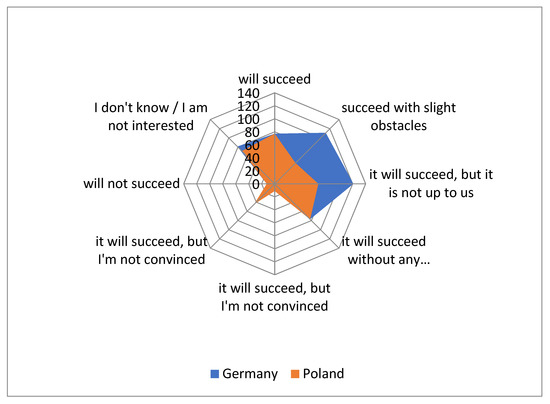
Figure 21.
Opinion of married individuals (not conducting business activity) in Poland and Germany.
Figure 21 below shows that Polish and German citizens were examined in terms of the opinions of married people (not running a business).
The opinion of married people in Poland and Germany in terms of success without any conditions is very similar. On the other hand, success with few obstacles and success recognized as independent of us in Poland and Germany is more than twice as large. The other values for the possibility of success are similar, as well as the perception of failure to succeed, which is also similar and to a slight degree.
Figure 22 below presents the opinions of an independent individual (without a couple).
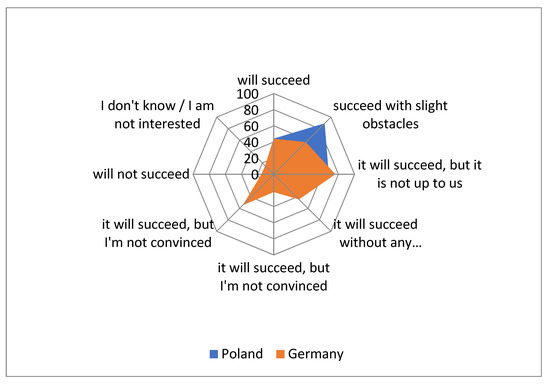
Figure 22.
Opinions a natural person independent (without a couple).
The opinion of independent individuals (without a couple) in Poland and Germany indicates an average extent of success. On the other hand, success with few obstacles is indicated in the majority of cases in Poland, and almost three times smaller in Germany.
Figure 23 below presents the opinions of people/entrepreneurs with knowledge in the field of innovation.
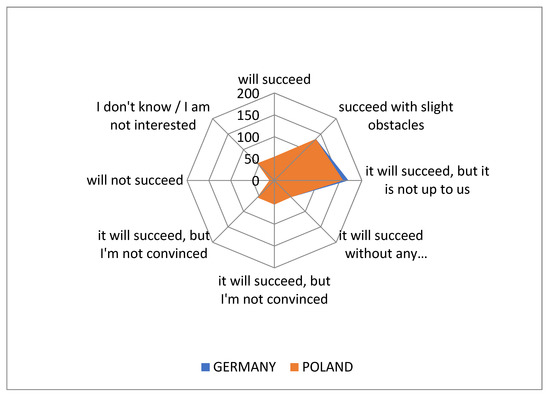
Figure 23.
Opinion of people/entrepreneurs launching innovation sharing.
The opinions of people/entrepreneurs with knowledge in the field of innovation contain similar values, but in turn, success with minor obstacles is around 15% greater in the case of Germany.
Figure 24 shows the opinion of entrepreneurs in a married relationship.
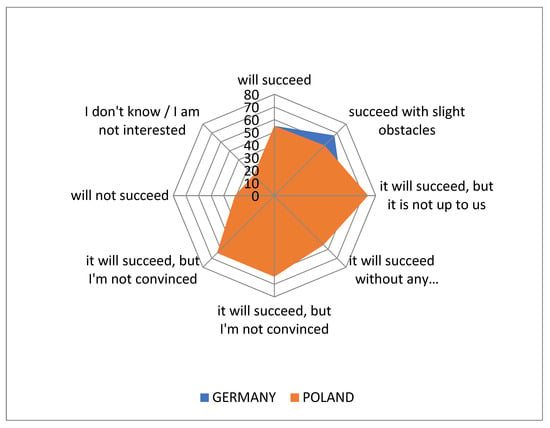
Figure 24.
Opinion of people who run businesses and are married at the same time.
The opinion of people running a business and being married at the same time clearly indicate success in Poland. On the other hand, in Germany, about 18% are much lower in terms of possible success. About 30% in Poland are distinguished by a success that is independent of such in relation to Germany.
Figure 25 below presents the opinions of people running an enterprise without marriage in Poland and Germany.
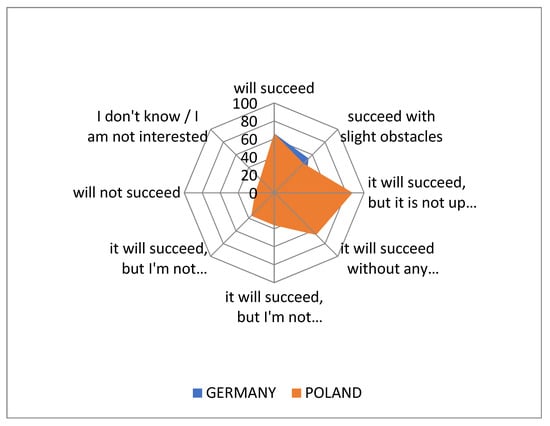
Figure 25.
Opinion of people running an enterprise without a marriage union (cohabitation).
The opinion of people running a business without marriage (cohabitation) indicates that the probability of success is the greatest in Germany than in Poland. More precisely, in Germany, about 28% more than in Poland, indicates a success that will succeed with minor obstacles, and a success that will succeed, but it does not depend on individuals, and a success that will succeed without any influence of other factors. In Poland, in turn, it exceeds the lack of interest in success by about 40% in relation to Germany.
The collective comparison of both countries, both Poland and Germany, may also turn out to be of key importance, as shown in Figure 26.
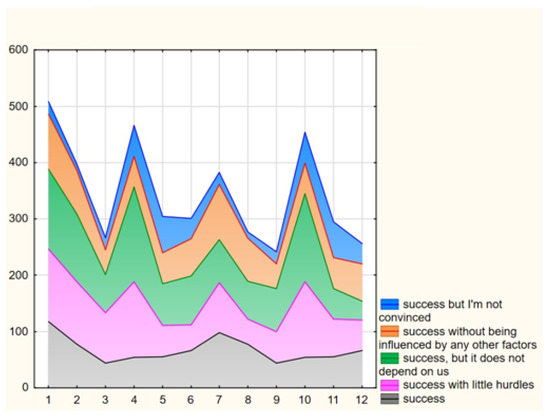
Figure 26.
Determination of the research problem of the factor (success) without division into countries.
Issuing opinions on success due to the size of the respondents, we indicate to the greatest extent “success, but it does not depend on us” and success with little hurdles. It can be said that these are real results of success. The least opinionated was success but I am not convinced. Success in this very concept of meaning is possible to a moderate extent.
Analysis of the research carried out in order to assess the possible success and its lack with various conditions (additional explanations). It turns out that the opinion both in Poland and Germany indicates, to the greatest extent, a possible lack of success in the opinion of individuals actively running businesses. It is similar for entrepreneurs (married or married) with other parameters, the same as in the previous case. Success, but in the absence of conviction, is in a similar strength and is indicated by (married or married entrepreneurs) entrepreneurs actively using innovations. Lack of success without any additional conditions, mostly of a slight intensity, concerns entrepreneurs (married or married) in the case of Poland and Germany, and an independent entrepreneur without a couple in the case of Poland.
Figure 27 below shows a graphical layered approach to success.
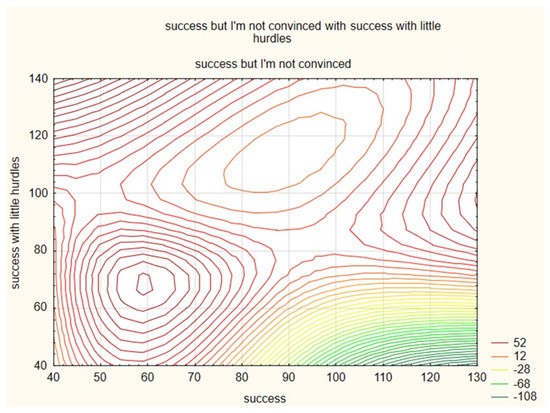
Figure 27.
A layered approach to success.
The use of a layered reading shows the similarity of the two examined factors, namely: success, but lack of awareness of this success, and gaining success, but with small obstacles. The obtained positive values of 52 and 12 allow to state the possibility of achieving success, but with the conditions. In principle, there can be one condition defined as small obstacles. There is a real possibility of achieving success with small obstacles. When interpreting this factor, it is worth adding information that it may be caused by a slightly protracted deadline, but not having a direct impact on the implementation of the entire process. The reason for this shift may also be deficiencies related to complementary goods. In this case, the complementary goods should be regarded as an addition or “something” that may be an additional functionality. The remaining values presented in the above chart as negative on one side indicate that success is possible around the 80th unit. On the other hand, in the previous negative case, the probability of achieving success becomes more distant, considering the distance aspect. In other words, it is slightly less likely to be successful with conditions.
4. Discussion
The internationally accepted scope of activities [62,63,64,65] aimed at avoiding the most serious effects of climate change is determined by the countries signing the postulates and supporting activities presented in Figure 28.
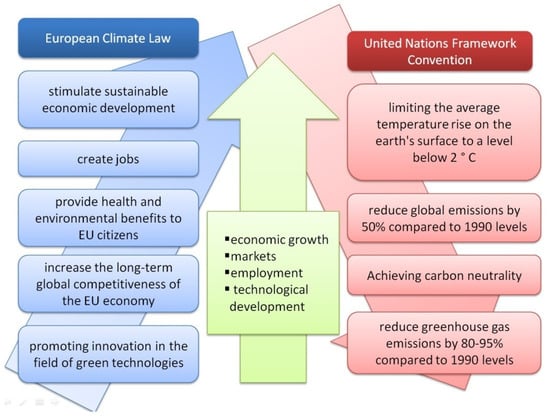
Figure 28.
Capabilities of stopping climate change [66,67,68,69].
The functioning of the Paris Agreement enables EU Member States to steer the principles of fairness, solidarity, ambition and efficiency [70]. The involvement of every citizen of the entire European Union can significantly contribute to halting climate change and a number of challenges, as shown in Figure 29 below.
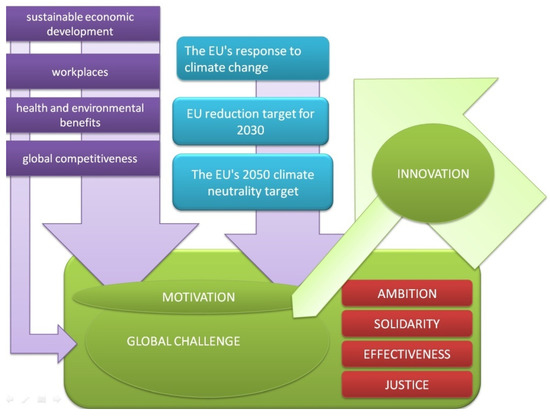
Figure 29.
Global challenge assuming innovation and motivation [70,71].
Does this enthusiasm and very authoritatively introduced procedures in this area go hand in hand with thinking towards the implementation of these assumptions? Taking into account the thinking process, another question arises: Will the implementation be consistent with the actual implementation of these postulates with full commitment?
This doubt results from a simple logical assumption published in many books from management, psychology and other related sciences. Will the implementation of the postulates be more reliable (active) if a given participant in this process (citizen) is aware that if he is passive, he will have no consequences? Proprietary research was carried out, the results of which are statistical analyses together with the proposed solution.
Depending on the type of role assumed, there are different citizens and different ways of thinking. In this work, the authors limit themselves to Poland and Germany in order to show that the state is more and less involved in the implementation of clean energy postulates.
4.1. Decision-Making Opinion Based on the Adopted Role and Success Criteria
Based on the previously conducted chi-squared statistical research, more precisely, the assessment of factors significantly influencing the rationality of decisions made in the direction of introducing innovative RES solutions, Figure 1 presents the possibilities that can be applied with the support of: the European Parliament, the Green Energy Implementation Strategy, and many others. The presentation shows the citizen as a subject of change, and not as a passive consumer. In this first part of the study, an analysis was undertaken through a survey process aimed at assessing the decision-making situation for Poland and Germany, and at the same time having an impact on success.
The way of thinking (beliefs, decisions) is crucial for learning (benchmarking). The decisions made by the citizen are important when considering the roles in which they function. The decision may be made on the basis of the opinion adopted by the spouse, cohabitant, or it may be different among businesspeople or not. There can be many conditions in this respect. The conducted analysis allowed to examine selected possibilities that may have an impact on the implementation of the expected changes that bring success. The conducted research in the first part allowed for a collective compilation of the existing assumptions generated on the basis of individual policies and a questionnaire survey.
Knowledge of the postulates occurs throughout the European Union (Poland, Germany), which is presented in (Figure 3), and the positive social opportunities are presented in (Figure 5). The negative effects of climate change, directly related to the negative effects for the citizen (Figure 6) and for the whole world (Figure 4), are also presented. We have knowledge of the legal conditions and the support of specialized international organizations offering help. There is also citizen awareness (or should exist) towards implementing changes. In order to do it, a citizen should feel the need and a willingness to change (motivation). All should engage in innovation activities through ambition, solidarity, efficiency, and equity (Figure 30).
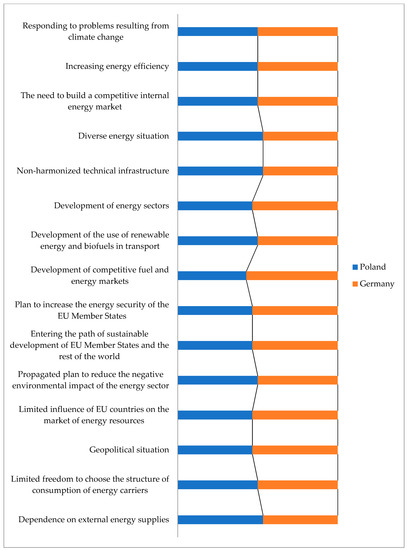
Figure 30.
Comparison of the issued opinion on the way of thinking of Poland and Germany (%).
The pilot study made it possible to present (Figure 19) social roles in connection with the achieved success in various conditions (Figure 29). This is the key to establishing the necessary learning opportunities (benchmarking).
An important observation is the opinion (Figure 21) that in Germany, to a greater extent than in Poland, they indicate success without any conditions for people who actively use innovations. Success in Germany is without any objections and independent of them. A similar opinion occurs among people who are married (not running a business), although to a greater extent (Figure 22). People who are married and giving an opinion tend to lack interest, which was indicated both in Germany and Poland, but in Poland to a lesser extent.
Natural persons without a couple (not running a business) (Figure 23) to a moderate (medium degree) unanimous vote both in Poland and Germany tend to be successful without any conditions. Most respondents in Germany stated that it is a success without any objections, and in Poland about 1/3 of people thought the same. A similar opinion is indicated by both countries indicating a success independent of them, where Germany to a small extent (about 10%) exceeds the opinion of Poland.
The opinion of entrepreneurs who are aware of innovation (Figure 24) shows a similar way of thinking both in Poland and Germany. Both countries do not believe much in success, and to a large extent (high) believe in its implementation without any conditions. In the upper limit of the average, both countries believe in success without any objections, and in success without their participation (with Poland having around 10% less).
The opinion of people running a business and being married at the same time (Figure 25) shows in both countries (Poland and Germany) that the results of th opineions are identical, except for the two assessed. The first is success without any objections, where in Germany it is about 10% higher than in Poland. Success independent of the respondents occurs almost 1/4 more in Poland than in Germany.
The opinion of people running an enterprise without marriage (cohabitation) (Figure 26) indicates success that does not depend on the respondents to the greatest extent in Poland, where in relation to Germany it is 1/3 less opinions in this respect. Success without any objections is greater in Germany by about 1/5 than in Poland. Success without any conditions, both in Germany and Poland, is unanimously and, in the lower part, on a high level.
The main hypothesis was confirmed, and all detailed hypotheses were confirmed except the last and the fourth one, which was partially confirmed, and more precisely, it was confirmed that citizens who play a role related to the enterprise (entrepreneurs) have greater convictions (opinion) towards the implementation of RES postulates. It has not been confirmed that the opinions of married citizens are more convinced of the implementation of the RES demands. Married Polish and German citizens are not interested in the implementation of RES demands.
The last hypothesis was rejected because the opinion of people running a business without marriage (cohabitation) indicates success that does not depend on the respondents to the greatest extent in Poland and to a lesser extent in Poland. Success without any conditions, both in Germany and Poland, is unanimously and, in the lower part, on a high level.
4.2. Comparison of the Way of Thinking of Poland and Germany
The starting point for the analysis is the assessment of the state of the energy sector in the EU. Energy policy goals in the 2030 perspective, they result from the current conditions of energy supply and the most important ones include: influence from external energy supplies, lack of freedom to choose the structure of energy consumption, geopolitical conditions, limited influence of EU countries on the energy raw materials market, widespread plans to reduce the negative impact of the energy sector on the environment entering the path of sustainable development of EU Member States and other countries in the world. Other points include a plan to increase the energy security of EU Member States and the development of competitive fuel and energy markets, as well as the development of the use of renewable energy sources and biofuels in transport.
Figure 30 presents a comparison of the opinions issued on the way of thinking of Poland and Germany in percentage terms.
The first three factors are perceived identically in both Poland and Germany. Another two are perceived by Poland to a greater extent in relation to Germany, by 10%. The opposite situation occurs to the previous one—the development of energy sectors. The opinion on development of the use of renewable energy and biofuels in transport is of the same value in the amount of 60% in both Poland and Germany. There were 4 identical opinions in Poland at the level of 7% and in Germany by 10%. This applies to: geopolitical situation, limited influence of EU countries on the market of energy resources, entering the path of sustainable development of EU Member States and the rest of the world, and planning to increase the energy security of the EU Member States.
5. Conclusions
Concern about climate change shows that all respondents (the European Union, Germany and Poland) are concerned about the costs of the energy transition, and to a comparable degree, though less so, have concerns about auditing, and less than half of them have concerns about meeting climate targets. Poland has the greatest concerns regarding the costs of implementing green energy.
The investment risk is to a greater extent perceived by Germany along with the possibility of uncertainty as to the implementation of the planned investment in line with the budget. The supply chain is unanimously assessed negatively as a resulting concern, with a significant result of no opinion.
Comparable in both countries is the reputation with a high lack of unambiguous opinion by respondents, along with the demand for implementation. The reaction to the climate crisis is similar in terms of negative consequences to the opinion of the European Union, with a tendency towards a more uncertain situation in relation to Poland than in relation to Germany.
The European Union has a positive attitude to the implementation of the postulates of energy transformation. The way of perceiving the functioning of enterprises in terms of changes is positive, but mostly negative in terms of the transaction impact on the supply chain. Germany is more optimistic about the steps towards the energy transition, probably due to the audits carried out (positive result) and the existence of delegated climate workers.
The timeframe for implementing the policy is too short, more radical changes would have to be made to create real opportunities for every link working together in this regard on the international arena. Close cooperation between all European Union countries is required. Poland must adapt to the requirements of the European Union community. Poland, despite the economic growth, does not achieve an even growth in renewable energy. It should be noted that what is required is commitment, openness to innovations and actions in accordance with the energy policy of the European Union. Basic management functions (planning, organizing, motivating and controlling) are crucial. Failure to meet the requirements of the energy policy should be thoroughly verified and consistently elaborated in order to involve the whole world. The lack of sanctions may reduce the effectiveness of achieving the goal of this undertaking. The key is radical and decisive decision making on the set goal of a radical economic recovery. It will not be realistic if the European Union will be the first in terms of climate neutrality by 2050 [72].
Innovative efforts are being made to implement renewable energy sources. The opinion of citizens towards defining an active or passive role for the implementation of the postulates aimed at implementing renewable energy sources is very important in the entire process of its implementation. Climate warming, caused to a large extent by the exploitation of non-renewable energy sources, is raising the water level. Therefore, it may mean that people will have to leave their places of residence, because their places will no longer be fit for life—they will be flooded. People are unaware of the negative effects of a failure to act to end climate change. It is difficult for them to acknowledge (or begin a thought process in this direction) that an accident may be about them. Higher temperatures, warmer climates can cause infectious diseases to spread more quickly. They also do not receive information that inhaling coal combustion products is also harmful to health. Suspended dust and heavy metals cause inflammatory processes in the body, and in the long run they lead to mutations resulting in the development of cancer; problems also develop with asthma. The key is to implement the form of innovation needed especially in the way of thinking, going beyond the box and noticing the possible negative consequences associated with it. Opinions among respondents in Poland and Germany allowed for the formulation of appropriate conclusions, it turns out that both in Poland and Germany, the response to the resulting climate changes is at a high level. Efforts are being made to increase energy efficiency and there is a strong need to build a competitive internal energy market. It seems reasonable that there is greater awareness of the difficult energy situation in Poland than in Germany. There is greater awareness and the need to act towards non-harmonized technical infrastructure in Poland. The awareness of the development of the energy sectors is much greater in Germany than in Poland. This does not raise any doubts, if only because of the results for Germany.
The development of the use of renewable energy and biofuels in transport is only 60% positively respected by both Poland and Germany in the opinion issued. Development of competitive fuel and energy markets. The plan to increase the energy security of the European Union countries is more positively respected and, at the same time, consistently implemented in Germany.
It turns out that Germany is more aware of the geopolitical situation than Poland. Limited freedom of choice of the energy consumption structure occurs both in Poland and Germany. Poland realizes that it is more dependent on external energy supplies than Germany. It should be emphasized that the environmental and local benefits in society are overvalued and result from low-emission energy methods in Poland. The change of policy in Germany was not dictated by higher conditioning of policy goals. The measures relating to Germany consist of increasing the share of renewable energy sources in electricity production and reducing greenhouse gas emissions by basing economic and social development on an energy mix in which conventional energy sources will be gradually replaced by renewable sources. Activities also consist of reducing primary energy consumption, expansion of renewable energy sources, development of onshore and offshore wind energy, and increasing energy efficiency. The measures taken in this area at the European Union level are also a point of reference for the energy policy of Poland and Germany. It can be assumed that Poland and Germany, despite the different conditions of national energy policies, are among the countries that want to support activities at the European Union level. It becomes justified to create the EU energy and climate policy in such a way as not to lower the level of energy security of both Poland and Germany. Rational functioning consists of increasing the security of energy supplies by using own energy resources, investing in renewable energy sources and diversifying the directions of energy supplies. Thanks to the development of energy infrastructure that will ensure a properly functioning internal energy market. They allow for security of supply through the integration of renewable energy sources.
Moreover, in the case of Poland, in relation to EU activities, it should be expected that such an approach to environmental protection requirements will be emphasized in the position which, to the greatest possible extent, will take into account the specificity of the Polish energy sector. On the other hand, in the case of Germany, the focus of the support provided for measures taken at the European Union level will be to ensure the sustainable development of the energy sector by raising efficiency and safety standards, increasing competitiveness and significantly reducing greenhouse gas emissions. Issuing an opinion on success due to the size of the respondents, we indicate to the greatest extent “successes, but it does not depend on us”, and success with small obstacles. It can be said that these are real results of success. Analysis of the research carried out in order to assess the possible success and its lack with various conditions (additional explanations). It turns out that the opinion both in Poland and Germany indicates the possible lack of success in the opinion of natural persons actively using innovations. It is similar for entrepreneurs (married or married)—with other parameters—the same as in the previous case. Success, but in the absence of conviction, is in a similar strength and is indicated by (married or married entrepreneurs) and entrepreneurs actively using innovations. Lack of success without any additional conditions, mostly of a slight intensity, concerns entrepreneurs (married or married) in the case of Poland and Germany, and an independent entrepreneur without a couple in the case of Poland.
The use of a layered reading shows the similarity of the two examined factors, namely: success, but lack of awareness of this success, and gaining success, but with small obstacles. The obtained positive values of 52 and 12 allow to state the possibility of achieving success, but with the conditions. In principle, there can be one condition defined as small obstacles. There is a real possibility of achieving success with small obstacles. When interpreting this factor, it is worth adding information that it may be caused by a slightly protracted deadline, but not having a direct impact on the implementation of the entire process. The reason for this shift may also be deficiencies related to complementary goods. In this case, the complementary goods should be regarded as an addition or “something” that may be an additional functionality. The remaining values presented in the above chart as negative on one side indicate that success is possible around the 80th unit. On the other hand, in the previous negative case, the probability of achieving success becomes more distant considering the distance aspect. In other words, it is slightly less likely to be successful with conditions. Factor analysis of a possible situation in which there is a probability of non-success in Germany. The probability of getting unsuccessful was demonstrated by independent pair-wise entrepreneurs. Most of the information presented shows the probability focused on respondents from the group of “independent entrepreneurs”, we see a large cluster in the mean and a median in the middle in the field of highest probability. Factor analysis of a possible situation where there is no success in Poland. The probability of not succeeding was presented by natural persons who are married. Married persons may constitute the possibility of success. It can be indicated that success is possible to a much greater extent by the involvement of people—entrepreneurs who actively use innovations in Poland. In turn, the probability of obtaining a lack of success was presented by married entrepreneurs.
The factor analysis of a possible situation in which there is a likelihood of a lack of success in Germany was presented by married entrepreneurs. The factors are evenly distributed. This means that the achieved success or the lack of it can be comparable to an equal degree. All postulates and conditions set out with the directives are of key importance and should be implemented around the world as soon as possible. It seems quite natural if we should do something and we do not have to—it’s only a part (more or less), but surely not everyone will do “what should be done.” The lack of firm orders or prohibitions towards actions leading to a situation of non-implementation of provisions consistent with the cessation or retention of a harmful action causes a risk manifested by negative consequences. The descriptive model increasing the effectiveness of the assumed RES targets has been proposed in Figure 31 below.
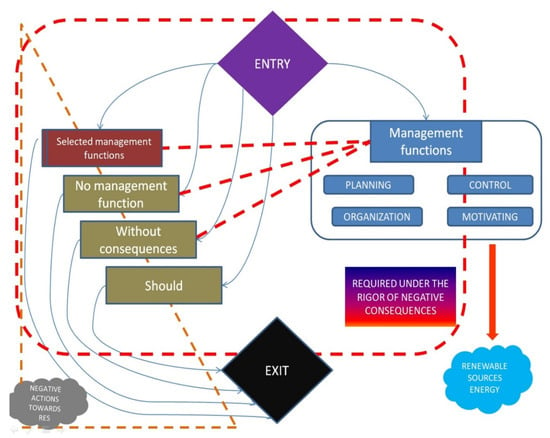
Figure 31.
Descriptive model increasing the effectiveness of the assumed RES targets.
What is required is a change in the “way of thinking” of citizens towards radical changes implementing the assumptions of clean energy. The way of thinking was proposed by the units supervising the correctness of the process carried out. It seems that not all selected management functions have been properly adapted. We cannot ignore control or planning and motivation; consistency in planned activities is required. Using vocabulary that points to success is not a very good word. Perhaps, however, this factor should be changed to successful, and thus take steps to achieve the expected renewable energy. The key is to take any action under pain of negative consequences. The basic management functions are very important in the process of management, change, and implementation of innovations.
Figure 32 shows a descriptive model that implements an innovative way of thinking.
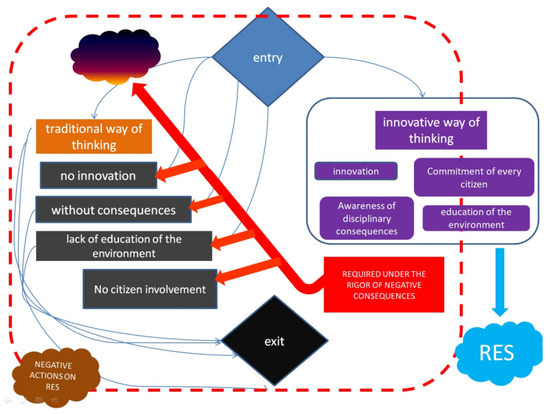
Figure 32.
Descriptive model implementing an innovative way of thinking.
The analysis carried out in the field of citizens’ opinions regarding the fulfillment of an active role can be consciously determined that on the left side there is a passive role, and on the right side there is an active role. The solution is a mindset (novel) towards innovation. The education of the community towards the involvement of the citizen becomes crucial—“they will not do, but I will do”. Two different countries were involved: Poland and Germany. Poland should learn from Germany how to efficiently implement planned structures aimed at obtaining “healthy energy”. It would seem that everything is easier and more reliable. Economic growth in Poland does not go hand in hand with the growth of renewable energy sources. The answer to the actions taken is the introduction of the principle of “cannot” but “must”, everything is about radically introduced changes in this area, creating a change in the way of thinking towards innovation. Positivism and enthusiastic thinking are still not enough to console yourself with a worthy solution.
Perhaps it is still hard to imagine what our dawn will look like in the future pandemics, flooded cities, countries, infectious diseases, allergies, and progressive unemployment. If we do not start making decisions radically, everything can become a reality.
The authors conclude that citizens should be active in activities for renewable energy. The EU has a strong backbone to work towards avoiding climate change. What is needed is innovative thinking and the motivation to introduce changes with the involvement of every citizen. Probably, if all citizens knew all the negative effects, and especially for society (citizens’ health), the effectiveness in terms of the activity of individual people would increase.
If the subject base is possible and ready for active action—then there may be no subject here—a citizen motivated to innovative, active action.
Analyzing the similar opinions of Poland and Germany, it seems that the possibility of obtaining distant consequences for the whole world is not appropriate. It is advisable not only to implement selected management functions, such as planning or organizing, but also, to a small extent, motivating. It is necessary to maximize the motivation and firmly implement the control process required under the pain of negative consequences, which are launched on an ongoing basis as a strategic preventive measure, and implement RES postulates towards a complete stop of climate change.
Author Contributions
Conceptualization, T.J., H.W. and I.M.; methodology, T.J., H.W. and I.M.; software, T.J., H.W. and I.M.; validation, T.J., H.W. and I.M.; formal analysis, T.J., H.W. and I.M.; investigation, T.J., H.W. and I.M.; resources, T.J., H.W. and I.M.; data curation, T.J., H.W. and I.M.; writing—original draft preparation, T.J., H.W. and I.M.; writing—review and editing, T.J., H.W. and I.M.; visualization, T.J., H.W. and I.M.; supervision, T.J., H.W. and I.M.; project administration, T.J., H.W. and I.M.; funding acquisition, T.J., H.W. and I.M. All authors have read and agreed to the published version of the manuscript.
Funding
The article was funded from research funds from the Academy of War Art in Warsaw and the University of Szczecin in Szczecin. The project was financed within the framework of the program of the Minister of Science and Higher Education in Poland under the name “Regional Excellence Initiative” in the years 2019–2022, project number 001/RID/2018/19, the amount of financing PLN 10,684,000.00.
Institutional Review Board Statement
Not applicable.
Informed Consent Statement
Not applicable.
Data Availability Statement
Data sharing not applicable.
Conflicts of Interest
The authors declare no conflict of interest.
References
- Rosenow, J.; Kern, F. EU energy innovation policy: The curious case of energy efficiency. In Research Handbook on EU Energy Law and Policy; Edward Elgar Publishing: Cheltenham, UK, 2017; pp. 501–518. [Google Scholar] [CrossRef]
- Czysta Energia. Innowacje Energetyczne Dzięki Zmianie Myślenia. Available online: https://www.europarl.europa.eu/news/pl/press-room/20180202IPR97028/czysta-energia-innowacje-energetyczne-dzieki-zmianie-myslenia (accessed on 3 August 2021).
- Energetyka Obywatelska w Polsce. Analiza Stanu i Rekomendacje Do Rozwoju. Available online: https://www.pine.org.pl/wp-content/uploads/2020/06/191021_InE_Opracowanie_v3_FNEZ_czyste.pdf (accessed on 7 August 2021).
- Kijek, T.; Kijek, A.; Bolibok, P.; Matras-Bolibok, A. The Patterns of Energy Innovation Convergence across European Countries. Energies 2021, 14, 2755. [Google Scholar] [CrossRef]
- W Kierunku Nowoczesnego Rynku Energii. Available online: https://rynek-energii-elektrycznej.cire.pl/pliki/2/raport_bezpieczenstwo-dostaw-energii-elektrycznej.pdf (accessed on 17 August 2021).
- Hilbe, J.M. STATISTICA 7: An overview. Am. Stat. 2007, 61, 91–94. [Google Scholar] [CrossRef]
- Climate Change Mitigation—European Environment Agency. Available online: https://www.eea.europa.eu/pl/themes/climate/intro (accessed on 5 August 2021).
- Oreskes, N. The scientific consensus on climate change: How do we know we’re not wrong? In Climate Modelling; Palgrave Macmillan: Cham, Switzerland, 2018; pp. 31–64. [Google Scholar]
- Lowe, T.; Brown, K.; Dessai, S.; de França Doria, M.; Haynes, K.; Vincent, K. Does tomorrow ever come? Disaster narrative and public perceptions of climate change. Public Underst. Sci. 2006, 15, 435–457. [Google Scholar] [CrossRef] [Green Version]
- Howlett, M.; Kemmerling, A. Calibrating climate change policies: The causes and consequences of sustained under-reaction. J. Environ. Policy Plan. 2017, 19, 625–637. [Google Scholar] [CrossRef]
- Moser, S.C.; Ekstrom, J.A. A framework to diagnose barriers to climate change adaptation. Proc. Natl. Acad. Sci. USA 2010, 107, 22026–22031. [Google Scholar] [CrossRef] [Green Version]
- Global Energy Transformation a Roadmap to 2050, Irena. Available online: https://www.irena.org/-/media/Files/IRENA/Agency/Publication/2018/Apr/IRENA_Report_GET_2018.pdf (accessed on 27 August 2021).
- Adapting the Energy Sector to Climate Change. Available online: https://www-pub.iaea.org/MTCD/Publications/PDF/P1847_web.pdf (accessed on 24 August 2021).
- European Investment Bank, FEMIP Study on Climate Change and Energy in the Mediterranean. Available online: https://www.eib.org/attachments/country/climate_change_energy_mediterranean_en.pdf (accessed on 24 August 2021).
- Climate Policy Tracker, Energy. Available online: https://climatepolicytracker.org/industries/energy/ (accessed on 24 August 2021).
- Μichalena, E.; Hills, J.M. Renewable energy issues and implementation of European energy policy: The missing generation? Energy Policy 2012, 45, 201–216. [Google Scholar] [CrossRef]
- Fact Sheets on the European Union, European Parliament, Energy Policy: General Principles. Available online: https://www.europarl.europa.eu/factsheets/en/sheet/68/energy-policy-general-principles, (accessed on 3 August 2021).
- Ozoegwu, C.G.; Akpan, P.U. A review and appraisal of Nigeria’s solar energy policy objectives and strategies against the backdrop of the renewable energy policy of the Economic Community of West African States. Renew. Sustain. Energy Rev. 2021, 143, 110887. [Google Scholar] [CrossRef]
- Lammers, I.; Hoppe, T. Analysing the institutional setting of local renewable energy planning and implementation in the EU: A systematic literature review. Sustainability 2018, 10, 3212. [Google Scholar] [CrossRef] [Green Version]
- Grace, R.C.; Donovan, D.A.; Melnick, L.L. When Renewable Energy Policy Objectives Conflict: A Guide for Policymakers. National Regulatory Research Institute, 2011. Available online: http://iie.uibe.edu.cn/pub/gjjjyjy/docs/20180115184922688464.pdf (accessed on 9 August 2021).
- Szpak, K. Polityka klimatyczna. In Polityka klimatyczna Unii Europejskiej w Perspektywie 2050 Roku; Polityka Klimatycna i jej Realizacja w Pierwszej Połowie XXI Wieku; Gajewski, J., Paprocki, W., Eds.; Publikacja Europejskiego Kongresu Finansowego, Centrum Myśli Strategicznych: Warszaw, Poland, 2020; p. 35. [Google Scholar]
- Faure-Schuyer, A.; Welsch, M.; Pye, S. European energy policy objectives. In Europe’s Energy Transition; Academic Press: Cambridge, MA, USA, 2017; pp. 31–39. [Google Scholar]
- Boichuk, N.; Kauf, S. Sustainable logistics: A framework for green city logistics–Examples of Polish cities. In Proceedings of the 9th Carpathian Logistics Congress-CLC 2019, Zakopane, Poland, 2–4 December 2019; pp. 2–4. [Google Scholar]
- Marks-Bielska, R.; Bielski, S.; Pik, K.; Kurowska, K. The importance of renewable energy sources in Poland’s energy mix. Energies 2020, 13, 4624. [Google Scholar] [CrossRef]
- Schmid, D.; Korkmaz, P.; Blesl, M.; Fahl, U.; Friedrich, R. Analyzing transformation pathways to a sustainable European energy system—Internalization of health damage costs caused by air pollution. Energy Strategy Rev. 2019, 26, 100417. [Google Scholar] [CrossRef]
- Schmidt, T.S.; Schmid, N.; Sewerin, S. Policy goals, partisanship and paradigmatic change in energy policy–analyzing parliamentary discourse in Germany over 30 years. Clim. Policy 2019, 19, 771–786. [Google Scholar] [CrossRef]
- Kud, K.; Woźniak, M.; Badora, A. Impact of the Energy Sector on the Quality of the Environment in the Opinion of Energy Consumers from Southeastern Poland. Energies 2021, 14, 5551. [Google Scholar] [CrossRef]
- Nikas, A.; Gambhir, A.; Trutnevyte, E.; Koasidis, K.; Lund, H.; Thellufsen, J.Z.; Doukas, H. Perspective of comprehensive and comprehensible multi-model energy and climate science in Europe. Energy 2021, 215, 119153. [Google Scholar] [CrossRef]
- Ortega, M.; del Río, P.; Ruiz, P.; Nijs, W.; Politis, S. Analysing the influence of trade, technology learning and policy on the employment prospects of wind and solar energy deployment: The EU case. Renew. Sustain. Energy Rev. 2020, 122, 109657. [Google Scholar] [CrossRef]
- D’Adamo, I.; Falcone, P.M.; Gastaldi, M.; Morone, P. RES-T trajectories and an integrated SWOT-AHP analysis for biomethane. Policy implications to support a green revolution in European transport. Energy Policy 2020, 138, 111220. [Google Scholar] [CrossRef]
- Inês, C.; Guilherme, P.L.; Esther, M.G.; Swantje, G.; Stephen, H.; Lars, H. Regulatory challenges and opportunities for collective renewable energy prosumers in the EU. Energy Policy 2020, 138, 111212. [Google Scholar] [CrossRef]
- Ocena Skutków Planowanych Polityk i Środków Załącznik 2. do Krajowego Planu na Rzecz Energii i Klimatu na Lata 2021–2030. Available online: https://ec.europa.eu/energy/sites/default/files/documents/pl_draft_necp_part_3.pdf (accessed on 23 August 2021).
- Sovacool, B.K.; Kryman, M.; Laine, E. Profiling technological failure and disaster in the energy sector: A comparative analysis of historical energy accidents. Energy 2015, 90, 2016–2027. [Google Scholar] [CrossRef]
- Gorlenko, N.V.; Murzin, M.A. Comparative analysis of fire risks in coal and oil and gas industries. IOP Conf. Ser. Mater. Sci. Eng. 2019, 687, 066009. [Google Scholar] [CrossRef]
- Baffes, J. Oil spills on other commodities. Resour. Policy 2007, 32, 126–134. [Google Scholar] [CrossRef] [Green Version]
- Jernelöv, A. The threats from oil spills: Now, then, and in the future. Ambio 2010, 39, 353–366. [Google Scholar] [CrossRef] [Green Version]
- Lehr, W.J.; Cekirge, H.M.; Fraga, R.J.; Belen, M.S. Empirical studies of the spreading of oil spills. Oil Petrochem. Pollut. 1984, 2, 7–11. [Google Scholar] [CrossRef]
- McGill, W.B. Soil restoration following oil spills-a review. J. Can. Pet. Technol. 1977, 16, PETSOC-77-02-07. [Google Scholar] [CrossRef]
- Chen, J.; Zhang, W.; Wan, Z.; Li, S.; Huang, T.; Fei, Y. Oil spills from global tankers: Status review and future governance. J. Clean. Prod. 2019, 227, 20–32. [Google Scholar] [CrossRef]
- Climate Change and Infectious Diseases. Available online: https://www.who.int/globalchange/climate/en/chapter6.pdf (accessed on 3 August 2021).
- How Does Climate Change Affect Disease? Stanford Earth Matters Magazine. Available online: https://earth.stanford.edu/news/how-does-climate-change-affect-disease#gs.bmswv3 (accessed on 3 August 2021).
- Frederick, K.D.; Major, D.C. Climate change and water resources. Clim. Chang. 1997, 37, 7–23. [Google Scholar] [CrossRef]
- Burgherr, P.; Eckle, P.; Hirschberg, S. Comparative assessment of severe accident risks in the coal, oil and natural gas chains. Reliab. Eng. Syst. Saf. 2012, 105, 97–103. [Google Scholar] [CrossRef]
- Epstein, P.R. Climate change and emerging infectious diseases. Microbes Infect. 2001, 3, 747–754. [Google Scholar] [CrossRef]
- Dincer, I. Renewable energy and sustainable development: A crucial review. Renew. Sustain. Energy Rev. 2000, 4, 157–175. [Google Scholar] [CrossRef]
- Menegaki, A.N. Growth and renewable energy in Europe: A random effect model with evidence for neutrality hypothesis. Energy Econ. 2011, 33, 257–263. [Google Scholar] [CrossRef]
- Tol, R.S. The economic impacts of climate change. Rev. Environ. Econ. Policy 2020, 12, 1. [Google Scholar]
- Juniper, E.F. Quality of life in adults and children with asthma and rhinitis. Allergy 1997, 52, 971–977. [Google Scholar] [CrossRef] [Green Version]
- Menegaki, A.N. Growth and renewable energy in Europe: Benchmarking with data envelopment analysis. Renew. Energy 2013, 60, 363–369. [Google Scholar] [CrossRef]
- Höijer, B. Emotional anchoring and objectification in the media reporting on climate change. Public Underst. Sci. 2010, 19, 717–731. [Google Scholar] [CrossRef] [PubMed]
- Dominković, D.F.; Bačeković, I.; Ćosić, B.; Krajačić, G.; Pukšec, T.; Duić, N.; Markovska, N. Zero carbon energy system of South East Europe in 2050. Appl. Energy 2016, 184, 1517–1528. [Google Scholar] [CrossRef] [Green Version]
- Gródek-Szostak, Z.; Luc, M.; Szeląg-Sikora, A.; Sikora, J.; Niemiec, M.; Ochoa Siguencia, L.; Velinov, E. Promotion of RES in a Technology Transfer Network. Case Study of the Enterprise Europe Network. Energies 2020, 13, 3445. [Google Scholar] [CrossRef]
- Europen Commission, Energy Research and Innovation, Why the EU Supports Energy Research and Innovation. Available online: https://ec.europa.eu/info/research-and-innovation/research-area/energy-research-and-innovation_en (accessed on 3 August 2021).
- Rogge, K.S.; Reichardt, K. Policy mixes for sustainability transitions: An extended concept and framework for analysis. Res. Policy 2016, 45, 1620–1635. [Google Scholar] [CrossRef]
- Walrave, B.; Talmar, M.; Podoynitsyna, K.S.; Romme, G.L.; Verbong, G.P.J. A multi-level perspective on, innovation ecosystems for path-breaking Innovation. Technol. Forecast. Soc. Chang. 2018, 136, 103–113. [Google Scholar] [CrossRef] [Green Version]
- Weber, K.M.; Rohracher, H. Legitimizing research, technology and innovation policies for transformative change: Combining insights from innovation systems and multi-level perspective in a comprehensive ‘failures’ framework. Res. Policy 2012, 41, 1037–1047. [Google Scholar] [CrossRef]
- European Environment Agency. Available online: https://www.eea.europa.eu/data-and-maps/indicators/renewable-gross-final-energy-consumption-5/assessment (accessed on 9 August 2021).
- EIBIS 2020—EU Overview, European Investment Bank 2021. Available online: https://www.eib.org/en/publications/econ-eibis-2020-eu (accessed on 9 August 2021).
- Unii Europejska j Przez Departament Ekonomii EBI. Available online: https://europa.eu/european-union/about-eu/institutions-bodies/european-investment-bank_pl (accessed on 27 August 2021).
- GUS. Główny Urząd Statystyczny. Available online: https://stat.gov.pl/wyszukiwarka/szukaj.html?query= (accessed on 3 August 2021).
- Federal Statistical Office of Germany. Available online: https://www.destatis.de/DE/Ueber-uns/Unsere-Aufgaben/_inhalt.html (accessed on 7 August 2021).
- Rada Europejska Przyjmuje Prawo Klimatyczne, Rada Unii Europejskiej. Available online: https://www.consilium.europa.eu/pl/press/press-releases/2021/06/28/council-adopts-european-climate-law/Fff (accessed on 11 August 2021).
- Europejskie Prawo o Klimacie, Rozporządzenie Parlamentu Europejskiego i Rady w Sprawie Ustanowienia Ram na Potrzeby Osiągnięcia Neutralności Klimatycznej i Zmiany Rozporządzeń (WE) No 401/2009 i (UE) 2018/1999. Available online: https://eur-lex.europa.eu/legal-content/PL/TXT/?uri=CELEX:32021R1119 (accessed on 9 August 2021).
- Barbier, E.B.; Hochard, J.P. The impacts of climate change on the poor in disadvantaged regions. Rev. Environ. Econ. Policy 2018, 12, 26–47. [Google Scholar] [CrossRef] [Green Version]
- Gasper, R.; Blohm, A.; Ruth, M. Social and economic impacts of climate change on the urban environment. Curr. Opin. Environ. Sustain. 2011, 3, 150–157. [Google Scholar] [CrossRef]
- Sharifi, A. Co-benefits and synergies between urban climate change mitigation and adaptation measures: A literature review. Sci. Total. Environ. 2021, 750, 141642. [Google Scholar] [CrossRef]
- Gössling, S.; Higham, J. The low-carbon imperative: Destination management under urgent climate change. J. Travel Res. 2021, 60, 1167–1179. [Google Scholar] [CrossRef]
- Snowdon, R.J.; Wittkop, B.; Chen, T.W.; Stahl, A. Crop adaptation to climate change as a consequence of long-term breeding. Theor. Appl. Genet. 2021, 134, 1613–1623. [Google Scholar] [CrossRef]
- Koengkan, M.; Fuinhas, J.A. Is gender inequality an essential driver in explaining environmental degradation? Some empirical answers from the CO2 emissions in European Union countries. Environ. Impact Assess. Rev. 2021, 90, 106619. [Google Scholar] [CrossRef]
- Porozumienie Paryskie. Available online: https://ec.europa.eu/clima/policies/international/negotiations/paris/ (accessed on 13 August 2021).
- Jäger-Waldau, A.; Kougias, I.; Taylor, N.; Thiel, C. How photovoltaics can contribute to GHG emission reductions of 55% in the EU by 2030. Renew. Sustain. Energy Rev. 2020, 126, 109836. [Google Scholar] [CrossRef]
- Jałowiec, T.; Wojtaszek, H. Analysis of the RES Potential in Accordance with the Energy Policy of the European Union. Energies 2021, 14, 6030. [Google Scholar] [CrossRef]
Publisher’s Note: MDPI stays neutral with regard to jurisdictional claims in published maps and institutional affiliations. |
© 2021 by the authors. Licensee MDPI, Basel, Switzerland. This article is an open access article distributed under the terms and conditions of the Creative Commons Attribution (CC BY) license (https://creativecommons.org/licenses/by/4.0/).